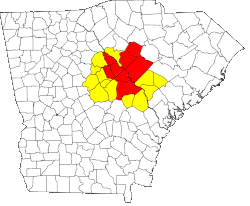Central Savannah River Area
Central Savannah River Area | |
|---|---|
CSRA | |
 | |
 Map outlining the Central Savannah River Area | |
| Country | |
| State | Georgia South Carolina |
| Largest city | Augusta |
| Area | |
• Total | 9,605 sq mi (24,880 km2) |
| • Land | 9,400 sq mi (24,000 km2) |
| • Water | 205 sq mi (530 km2) 2.1% |
| Population (2018) | |
• Total | 767,478 |
| • Density | 80/sq mi (31/km2) |
| Time zone | UTC-5 (EST) |
| • Summer (DST) | UTC-4 (EDT) |
| Area codes | 478, 706, 762, 803, 839, 864, 821, |
The Central Savannah River Area (CSRA) is an unofficial trading and marketing region in the U.S. states of Georgia and South Carolina, spanning thirteen counties in Georgia[1][2] and seven in South Carolina.[3] The term was coined in 1950 by C.C. McCollum, the winner of a $250 contest held by The Augusta Chronicle to generate the best name for the area. Today the initialism is so commonly used that the full name is not known to all CSRA residents.[3] The region is located on and named after the Savannah River, which forms the border between the two states. The largest cities within the CSRA are Augusta, Georgia and Aiken, South Carolina. (The CSRA does not include the city of Savannah, Georgia or any portion of the Savannah metropolitan area.)
The total population of the CSRA is 767,478 in 2018. According to the U.S. Census Bureau, the seven-county Augusta-Richmond County Metropolitan Statistical Area (the core of the CSRA) had a 2020 population of more than 611,000,[4] making it the second most populous (after metro Atlanta) in the state of Georgia.
Counties
[edit]In Georgia
[edit]| County | Total Area | Population (2018) |
|---|---|---|
| Richmond County | 329 sq mi (850 km2) | 201,554 |
| Columbia County | 308 sq mi (800 km2) | 154,291 |
| Burke County | 835 sq mi (2,160 km2) | 22,423 |
| McDuffie County | 266 sq mi (690 km2) | 21,531 |
| Washington County | 684 sq mi (1,770 km2) | 20,386 |
| Jefferson County | 530 sq mi (1,400 km2) | 15,430 |
| Wilkes County | 474 sq mi (1,230 km2) | 9,876 |
| Jenkins County | 352 sq mi (910 km2) | 8,683 |
| Hancock County | 479 sq mi (1,240 km2) | 9,429 |
| Lincoln County | 257 sq mi (670 km2) | 7,915 |
| Warren County | 287 sq mi (740 km2) | 5,251 |
| Glascock County | 144 sq mi (370 km2) | 2,995 |
| Taliaferro County | 195 sq mi (510 km2) | 1,608 |
| Total: | 5,796 sq mi (15,010 km2) | 495,310 |
In South Carolina
[edit]| County | Total Area | Population (2018) |
|---|---|---|
| Aiken County | 1,081 sq mi (2,800 km2) | 170,872 |
| Edgefield County | 507 sq mi (1,310 km2) | 27,052 |
| Barnwell County | 557 sq mi (1,440 km2) | 21,112 |
| Saluda County | 462 sq mi (1,200 km2) | 20,544 |
| Bamberg County | 396 sq mi (1,030 km2) | 14,275 |
| McCormick County | 394 sq mi (1,020 km2) | 9,410 |
| Allendale County | 412 sq mi (1,070 km2) | 8,903 |
| Total: | 4,937 sq mi (12,790 km2) | 272,168 |

Communities
[edit]Places with more than 40,000 inhabitants
[edit]- Augusta-Richmond County, Georgia (Principal city) Pop: 197,872
Places with 10,000 to 40,000 inhabitants
[edit]- Martinez, Georgia Pop: 35,795
- Aiken, South Carolina Pop: 29,884
- Evans, Georgia Pop: 29,011
- North Augusta, South Carolina Pop: 21,873
- Grovetown, Georgia Pop: 12,210
Places with 5,000 to 10,000 inhabitants
[edit]- Thomson, Georgia Pop: 6,718
- Belvedere, South Carolina Pop: 5,792
- Waynesboro, Georgia Pop: 5,816
- Sandersville, Georgia Pop: 5,912
Places with 1,000 to 5,000 inhabitants
[edit]
|
|
Places with less than 1,000 inhabitants
[edit]
|
|
References
[edit]- ^ "CSRARC". csrarc.ga.gov. Retrieved 2024-06-08.
- ^ "East Georgia - Region 7 | Georgia Department of Economic Development".
- ^ a b Cox, Timothy (2007-07-23). "What does CSRA mean?". The Augusta Chronicle. Retrieved 2024-06-08.
- ^ "Columbia County outpaces state population gains".
External links
[edit]- CSRA Regional Commission (only encompassing the 13 Georgia counties)
- CSRA Economic Opportunity Authority, Inc. (only encompassing the 13 Georgia counties)
- Savannah River Site: CSRA Regional Science and Engineering Fair Regional science fair competition for science projects winning first-place at their respective schools (Grades 4-12)
- Columbia County outpaces state population gains


 French
French Deutsch
Deutsch